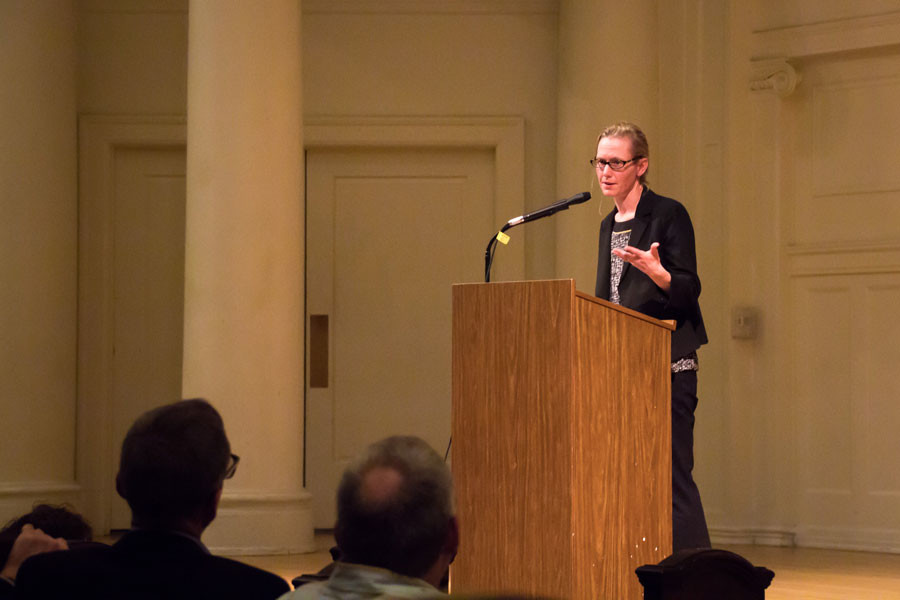Sociologist discusses economic insecurities, income inequality at Connections for the Homeless event
Joseph Lamps/The Daily Northwestern
Stanford sociologist Marianne Cooper address more than 40 audience members Wednesday evening at an event sponsored by Connections for the Homeless. The nonprofit invited Cooper to speak about her findings on income inequality and economic strategies that she explored in her 2014 book, “Cut Adrift: Families in Insecure Times.”
October 21, 2015
A Stanford sociologist discussed economic inequality Wednesday at an event organized by Connections for the Homeless, a nonprofit coping with decreased funding due to diminishing state budget allocations for such organizations.
More than 40 people gathered at the Nichols Concert Hall, 1490 Chicago Ave, to hear Marianne Cooper, an affiliate at the Stanford Center on Poverty and Inequality, give a talk based on her 2014 book, “Cut Adrift: Families in Insecure Times,” in which she examines the effect of economic instability on families of different socioeconomic statuses.
“On a daily basis, we’re living a new American reality, which is that it’s tougher out here than it used to be,” Cooper said. “Academics have concluded that there are almost unprecedented levels of economic inequality and economic insecurity, which is a pretty amazing discovery.”
For the book, Cooper said she interviewed and shadowed several families in the Silicon Valley area to focus on how they dealt with economic difficulties.
She said she found poorer families favored downscaling, in which they scaled back their definition of financial security so that they would be satisfied with the little they had. Others, particularly the affluent families, used upscaling, in which they constantly tried to accumulate more as the state of the economy drove them to deep anxiety.
The third strategy, what she called “holding on,” was mostly a middle-class technique, Cooper said. She said women in families that employ that strategy bear much of the burden of a bad economy, guiding the families through pay cuts, layoffs and job searches.
She said the final coping mechanism is “turning to God,” in which struggling families embrace their religion and hope God will help solve their problems.
“The reality is that a lot of people have been so beaten down by the economy that they have stopped hoping for more,” Cooper said. “Planning ahead, having these long term goals is not only hopeless, it’s painful. Which really calls into question the idea of ‘planning your life.’”
Connections, which provides housing, employment and supportive services to homeless and at-risk Evanston residents, organized the event. It’s the second time the group has hosted a fall event, said Sue Loellbach, Connections’ acting executive director.
So far, the organization raised between $5,000 and $7,000 from the event through donations and the sales of tickets ranging from $100 to $5,000 apiece, said Lisa Todd, Connections’ community outreach manager.
This event was not solely meant to be a fundraiser for Connections, but more an opportunity to create a rapport within the community and educate people interested in poverty, homelessness and economic inequality, Todd said.
Loellbach said Connections has been financially compromised by the lack of a state budget, which has led to late or missing checks to social services organizations across the state. The organization’s programs have been slowed by the decrease in funding, she said. The nearly four months without an Illinois budget has caused several Evanston social services organizations to consider programming or staffing cuts.
She said the team also had to cut their drop-in program that lets people take showers, pick up food and clothing, use phones and computers, and meet with case managers, doctors and nurses.
“We decided the longest term impact was our ongoing work with folks to get them into housing,” Loellbach said. “We’re not going to be able to handle the full load but we’re gearing up to do as much as we possibly can.”
However, the organization is “pretty solid” right now due to the layoffs it made in July, Loellbach said. She said the team is trying to prepare for an expected influx of people seeking help this fall and winter, especially because many other agencies that provide similar services are failing at the moment.
“It’s absolutely ridiculous that our legislators can’t have a budget in place,” Loellbach said. “I have to have my budget in place on time, every other non-profit leader has to have their budget in place on time, and the state that supports all of us, and is really our boss, doesn’t have to.”
Email: [email protected]
Twitter: @rdugyala822


